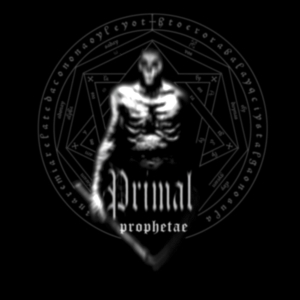
Primal are a one-man act from Poland, created in 2008 by PrimalOne, and pretty active in between 2010 and 2014. The End Of Time Records and Quid Est Veritas Productions did release some of the material, amongst which the truly fantastic Deathzone-album, Primal’s full length debut (for the review: see the update on September 21st 2014). Another ‘older’ release, done in collaboration by both bands, is Prophetae, initially released in August 2013.
This album consists of five hymns, lasting in between seven and twelve minutes (four of them clocking over ten minutes), which are called I, II, III, IV and, indeed, V. I’d like to start this time with some concerns about the production. Well, actually, I have none. Nothing to be concerned of, for the sound quality is like it needs to be: rough-edged, even rusty, unpolished and scratchy, with a somewhat dense mix and… Yep, there is one issue I do have, being that mix. I am pretty disappointed, once again, not to notice the bass lines that clearly, and the vocals too sometimes sound way too distant – and I am sure this was not the purpose. Yet overall this production is the one that goes pretty well with the sonic execution.
Brings me to the five compositions, which are pretty much comparable to the former releases in approach and atmosphere. The drum computer sort of drenches the whole in a mechanical, even little industrial mud-bath, but because it lacks of exaggeration, it does not irritate or annoy. The primitive and nihilistic song writing too are a surplus that characterises this project. Primal do not search for complexity, yet then again they are not swinging in the pool of simplistic Second Wave grimness either. Despite the lack of originality or renewal, there is no repetition of tradition as well. I know that this might sound odd, but in this band’s case that surely is a positive element. And another highly interesting yet difficultly definable contrast is the balance in between nihilism / primitivism at the one hand, and quite some dissonance at the other. Especially within the riffing and leads, those discordant accords act like quite an intelligent contrast to the lo-fi filthiness elaborated through mercilessly rhythms and no-nonsense structures.
This is a like-it-or-not release, I am sure. I do not blame people for being part of the ‘not’-category (though I think they are [censorship]), but a couple of listens might reveal much more levels underneath the surface than you might expect after a first try.
